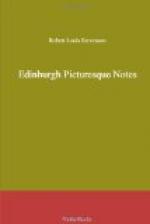The place in the dell is immediately connected with the city. Long ago, this sheltered field was purchased by the Edinburgh magistrates for the sake of the springs that rise or gather there. After they had built their water-house and laid their pipes, it occurred to them that the place was suitable for junketing. Once entertained, with jovial magistrates and public funds, the idea led speedily to accomplishment; and Edinburgh could soon boast of a municipal Pleasure House. The dell was turned into a garden; and on the knoll that shelters it from the plain and the sea winds, they built a cottage looking to the hills. They brought crockets and gargoyles from old St. Giles’s which they were then restoring, and disposed them on the gables and over the door and about the garden; and the quarry which had supplied them with building material, they draped with clematis and carpeted with beds of roses. So much for the pleasure of the eye; for creature comfort, they made a capacious cellar in the hillside and fitted it with bins of the hewn stone. In process of time, the trees grew higher and gave shade to the cottage, and the evergreens sprang up and turned the dell into a thicket. There, purple magistrates relaxed themselves from the pursuit of municipal ambition; cocked hats paraded soberly about the garden and in and out among the hollies; authoritative canes drew ciphering upon the path; and at night, from high upon the hills, a shepherd saw lighted windows through the foliage and heard the voice of city dignitaries raised in song.
The farm is older. It was first a grange of Whitekirk Abbey, tilled and inhabited by rosy friars. Thence, after the Reformation, it passed into the hands of a true-blue Protestant family. During the covenanting troubles, when a night conventicle was held upon the Pentlands, the farm doors stood hospitably open till the morning; the dresser was laden with cheese and bannocks, milk and brandy; and the worshippers kept slipping down from the hill between two exercises, as couples visit the supper-room between two dances of a modern ball. In the Forty-Five, some foraging Highlanders from Prince Charlie’s army fell upon Swanston in the dawn. The great-grandfather of the late farmer was then a little child; him they awakened by plucking the blankets from his bed, and he remembered, when he was an old man, their truculent looks and uncouth speech. The churn stood full of cream in the dairy, and with this they made their brose in high delight. ‘It was braw brose,’ said one of them. At last they made off, laden like camels with their booty; and Swanston Farm has lain out of the way of history from that time forward. I do not know what may be yet in store for it. On dark days, when the mist runs low upon the hill, the house has a gloomy air as if suitable for private tragedy. But in hot July, you can fancy nothing more perfect than the garden, laid out in alleys and arbours and bright, old-fashioned flower-plots, and ending in a miniature ravine, all trellis-work and moss and tinkling waterfall, and housed from the sun under fathoms of broad foliage.




